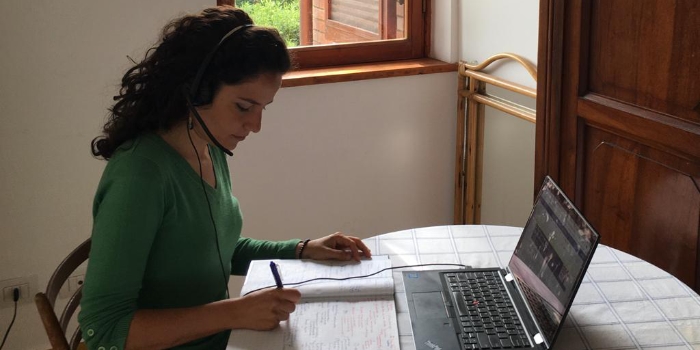Rapid response-mode policy support to countries facing COVID19-related social and economic disaster
As economies worldwide grind to a halt due to lockdown measures, the star of social protection is rising: Governments which saw social protection schemes as ‘nice-to-haves’ now recognise that they are essential for their populations’ and their own political survival. What can be done, right here, right now? A rapid response team provides orientation.
‘The thing is that this type of crisis is new. There is no time to come up with perfect answers. Our aim is to support answers that are good enough, and to do so quickly,’ says Katharina Diekmann, a social protection advisor with the Deutsche Gesellschaft für Internationale Zusammenarbeit (GIZ) GmbH and a member of what could be called the ‘social protection COVID-19 rapid response team.’
The Sector Initiative Social Protection and the Global Alliances for Social Protection, both implemented by GIZ on behalf of the Federal Ministry for Economic Cooperation and Development (BMZ), joined up with international partners as requests for policy advice from projects and partner governments multiplied. What can be done to mitigate the social and economic impact of the coronavirus crisis on different population groups? The challenges ahead are enormous.
A moment of truth for countries’ social protection systems
At the time of writing, the coronavirus pandemic has reached nearly every corner of the world. Governments around the globe have imposed lockdowns, and a severe global recession seems unavoidable. Informal sector workers and the self-employed on every continent are already struggling to cope with the economic fallout. As more and more companies let go of their staff, formally employed workers are losing their income, too. Many low- and lower middle-income countries lack the comprehensive social protection systems and programmes that would be needed to cushion the blow.
From early March onwards, governments worldwide began to recognise that existing social protection mechanisms had to be mobilised and new ones had to be developed. The Government of Cambodia was one of the first to approach GIZ for technical advice on how to proceed. ‘We saw that we needed to find new ways of providing highly specialised advice to our partners around the globe – and we needed to find a mechanism for this quickly,’ says Ralf Radermacher, team leader for the Sector Initiative Social Protection and the Global Alliances for Social Protection. ‘Other partners were thinking along the same lines and, once we started down this road, things moved fast. Thanks to good cooperation, we managed to jointly put three initiatives in place in a short period of time.’
A helpdesk staffed by renowned and independent experts

On April 1, GIZ and the UK’s Department for International Development (DFID) jointly launched SPACE: the Social Protection Approaches to COVID-19 Expert advice helpline. A team of internationally renowned social protection experts has been providing conference call consultations to country programmes and/or government representatives from across the world. Topics covered range from the identification of those most affected by the impacts of the crisis to ways of quickly providing contactless payments to them and how to determine an adequate transfer amount. The overarching question has been how existing social protection programmes can be leveraged to quickly reach as many people as possible and how gaps in social protection systems can be filled through humanitarian responses.
When new requests come in, team members arrange a preliminary call to clarify the nature of the demand. On this basis, they decide which experts to involve in the in-depth consultation that ensues – a conference call that typically lasts for around two hours. In these calls, the experts provide a range of different options and approaches that can be considered to address the specific question in the given country context, including related risks and opportunities. The country requesting support can ask for additional analytical work to be undertaken by the experts following the call.
Weekly webinars put crisis-responsive social protection in the limelight
‘The response has exceeded all our expectations’ says Jakob Lessin, GIZ social protection advisor. Approximately 350 people from countries worldwide have attended each of the series of weekly topical webinars on crisis-responsive social protection measures that GIZ has been organizing in cooperation the International Policy Centre for Inclusive Growth (IPC-IG) and the Department of Foreign Affairs and Trade of Australia (DFAT). Run on the platform socialprotection.org, these webinars provide a space to present and discuss social protection options and experiences just when they are needed most. To cater to audiences in all time zones, the webinars are recorded and can be found on the site linked above.
Contributors to the series have included DFAT, Help Age International, the International Labour Organization (ILO), the World Bank, the German Development Institute (GDI/DIE), independent consultants, academia and government partners sharing hands-on experience. Topics include the whole spectrum of social protection measures needed to mitigate the social and economic crisis triggered by the pandemic, from G2P (Government to Person) payments to measures to support the elderly, the self-employed, those working in the informal sector, as well as pathways to nutrition and lessons for the current crisis from universal basic income programmes. ‘We have topics for upcoming webinars already lined up, and plan to continue the series at least until July,’ says Lessin.
An online community and clearing house for relevant documents

To ensure mutual learning in real-time as the crisis unfolds country by country, GIZ in cooperation with IPC-IG and DFAT has also set up an online community on socialprotection.org. The community provides access to several hundred relevant documents and articles on social protection in times of COVID-19. They are grouped by region and include legal documents as well as op-eds, reviews and blogs from all over the world. Around 4500 people have subscribed to a weekly newsletter which publicises new contributions and provides links to upcoming and past webinars.
Time to invest in no-regret social protection policies
Social protection experts in Germany and their colleagues worldwide know that the decisions governments are taking right now on how to protect their population against the social and economic impact of the crisis will shape countries’ futures for years to come. This underscores the need for high quality policy advice.
Stefan Dercon recently observed that, ‘given the massive uncertainty surrounding how COVID-19 will play out in terms of health outcomes as well as economic and social outcomes, policymaking is as hard as it can possibly be.’ Like the experts working in the three initiatives described above, Dercon regards the investments governments currently make in their social protection systems and in people’s livelihoods as ‘no-regret policies’. Tackling the social protection gaps the current crisis reveals will pay off – regardless of how the pandemic is going to develop in the coming weeks and months.
Anna von Roenne, April 2020

